|
President Tetlow said, “I have been very fortunate to have the guidance and support of AJCU’s board since 2018, when I was a new president at Loyola University New Orleans. It is an extraordinary group of leaders and I am humbled to be one of them, much less to chair our board.”
]]>Read her quote from the AJCU announcement:
President Tetlow said, “I have been very fortunate to have the guidance and support of the AJCU’s board since 2018, when I was a new president at Loyola University New Orleans. It is an extraordinary group of leaders and I am humbled to be one of them, much less to chair our board.”
]]>
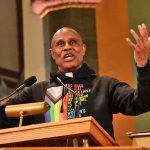
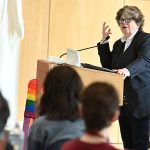
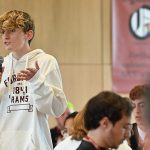
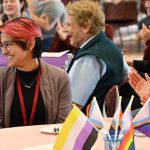
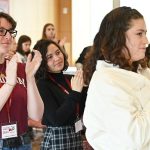
 It was an event that fostered connection and hope—and moved some student to tears. On the weekend of April 21 to 23, students from 14 Jesuit colleges and universities came to Fordham for Ignatian Q, a conference emphasizing community, spirituality, and ways of achieving full inclusion and belonging for LGBTQ+ students on their campuses. The conference has been hosted at various schools in the Association of Jesuit Colleges and Universities (AJCU) since it was founded at Fordham in 2014.
It was an event that fostered connection and hope—and moved some student to tears. On the weekend of April 21 to 23, students from 14 Jesuit colleges and universities came to Fordham for Ignatian Q, a conference emphasizing community, spirituality, and ways of achieving full inclusion and belonging for LGBTQ+ students on their campuses. The conference has been hosted at various schools in the Association of Jesuit Colleges and Universities (AJCU) since it was founded at Fordham in 2014.
The messages conveyed during keynote speeches, breakout sessions, a Mass, and other events made for a conference that was, in the words of one organizer, “amazing.”
“I don’t even know how to describe it. Everyone was crying. It was more than I could have ever hoped for,” said Ben Reilly, a senior at Fordham College at Rose Hill and chair of the Ignatian Q Planning Committee. “It seems to have breathed life into the conversation around LGBT life on campus and LGBT student community, and the importance of community both at Fordham and across our AJCU family.”
Speakers were unsparing in describing the obstacles to LGBTQ+ equality. The weekend began with a keynote at the Church of St. Paul the Apostle, next to the Lincoln Center campus, by Bryan Massingale, S.T.D., a gay Catholic priest and the James and Nancy Buckman Chair in Applied Christian Ethics at Fordham.
He spoke of the necessity of dreaming as a step toward creating a just society in which people no longer face intolerance and violence because of gender identity or gender expression.
“That dream is under attack—blatant attack, disturbing attack,” he said, citing laws against “life-saving, gender-affirming medical care” and discussion of LGBTQ topics in schools, among other things. “There are serious efforts underway,” he said, “to create a world in which we don’t exist.”
He decried the idea that “God does not love us and we are not worthy,” saying “we have to dream of a world and a church where that lie is put to rest.” During his address, he prompted everyone in the pews to turn to one another and give affirmations including “you are loved” and “you are sacred.”
Visibility, Understanding, Acceptance
Saturday’s keynote was delivered at the Rose Hill campus by Joan Garry, FCRH ’79, a nationally recognized LGBTQ activist and former executive director of the gay rights organization GLAAD.
“The LGBTQ movement for equality needs all of you—badly,” said Garry, who serves on the executive committee of the President’s Council at Fordham. She urged the students to be activists who foster greater inclusivity at their colleges and universities and provide a model for other LGBTQ students who may be struggling.
“Visibility drives understanding, and understanding drives acceptance,” she said. “When you are ‘out,’ you model authenticity and honesty, and you show people the way. We illustrate that one does not have to be controlled by the expectations of others, and do you know how big that is? That’s a superpower.”
The event was supported by Campus Ministry and the Office of Mission Integration and Ministry. Father Massingale celebrated Mass at the Lincoln Center campus on Sunday, and for some students, it was their first time attending Mass since coming out, Reilly said.
Also on Sunday, in a keynote at the Lincoln Center campus, James Martin, S.J., the prominent author and editor at large at America magazine, said the openness of more and more LGBTQ people in parishes and dioceses ensures that the Catholic Church will continue to become more open to them.
“As more and more people are coming out, more and more bishops have nieces and nephews who are openly gay. That just changes them,” he said. “And that’s not going to stop.”
]]>At this moment when our undocumented students are most vulnerable and afraid, I am writing to you to inform you that I have signed three documents that I hope make it clear that Fordham sees and embraces undocumented students as valued and loved members of our community, that Fordham stands with them, and that we will do all we can to be effective advocates for them. Since my signature signals not only my endorsement, but the endorsement of the entire University community of the sentiments contained in them, I assure you that I did not sign them lightly. Rather, I did so only after a great deal of research and prayer.
Because he was himself an immigrant and the victim of prejudice and discrimination both in Ireland and in the United States, and because he was the bishop of a largely immigrant community that suffered from the same discrimination from which he had suffered, Archbishop Hughes was passionately devoted to America’s immigrants. Therefore, when he founded Saint John’s College (Fordham University) in 1841, he did so to create a school that would make it possible for the immigrants whom he served to receive an education that would both confound their enemies and enable them to take their rightful place in American society.
For its entire 175-year history, Fordham has kept faith with its founder’s vision and committed itself in a special way to serving immigrants and their sons, daughters, grandsons and granddaughters. To be sure, the ethnic identities of the students whom Fordham has served have changed in the course of time. Through the decades, however, the University has never deviated from its historic mission of welcoming and serving new Americans, a mission that has shaped and defined us, and a mission that has enriched us beyond measure. I would be less than honest if I didn’t tell you that as the grandson of four Irish immigrants and the son of a first-generation college graduate whose life was transformed by the education that he received here at Fordham, the University’s devotion to and service of generations of new Americans is especially close to my heart.
Of course, Archbishop Hughes’s legacy is not the only reason that the University has always been drawn to the service of new Americans. Far from it. Our Catholic roots remind us of the Gospel mandate to serve those at the peripheries, and to treat them as cherished sisters and brothers. Our Jesuit identity places upon us the sacred responsibility to treat every student in our care with cura personalis, that is to say, we are called and challenged to treat every Fordham student with reverence, respect and affirming love.
In light of the powerful forces that have shaped us, we can never turn away from those members of our community who are most vulnerable. To do so would be a betrayal of both the ideals that we hold most dear and the sacred mission to which we have devoted ourselves for the past 175 years. We simply cannot do that. We will not do that.
Below is the complete text of the statement written by the presidents of the member schools of the Association of Jesuit Colleges and Universities (AJCU), and links to the 2013 AJCU statement, the Pomona Statement, and the statement of the member schools of the Association of Catholic Colleges and Universities.
As I close, let me ask you to pray for all of our students, and especially our undocumented students. I assure you that you all remain in my prayers.
Joseph M. McShane, S.J.
President
Statement of AJCU Presidents – November 2016
As Presidents of the Association of Jesuit Colleges and Universities we feel spiritually and morally compelled to raise a collective voice confirming our values and commitments as Americans and educators. We represent colleges and universities from across our nation with more than 215,000 students and more than 21,000 faculty, and more than 2 million living alumni.
Grounded in our Catholic and Jesuit mission, we are guided by our commitment to uphold the dignity of every person, to work for the common good of our nation, and to promote a living faith that works for justice. We see our work of teaching, scholarship and the formation of young minds and spirits as a sacred trust.
That trust prompts us to labor for solidarity among all people, and especially with and for the poor and marginalized of our society. That trust calls us to embrace the entire human family, regardless of their immigration status—or religious allegiance. And experience has shown us that our communities are immeasurably enriched by the presence, intelligence, and committed contributions of undocumented students, as well as of faculty and staff of every color and from every faith tradition.
Therefore, we will continue working:
- To protect to the fullest extent of the law undocumented students on our campuses;
- To promote retention of the Deferred Action for Childhood Arrivals Program (DACA);
- To support and stand with our students, faculty and staff regardless of their faith traditions;
- To preserve the religious freedoms on which our nation was founded.
As we conclude this Year of Mercy, we make our own the aims enunciated by Pope Francis: “Every human being is a child of God! He or she bears the image of Christ! We ourselves need to see, and then to enable others to see, that migrants and refugees do not only represent a problem to be solved, but are brothers and sisters to be welcomed, respected and loved.”
We hope that this statement will inspire members of our University communities, as well as the larger national community, to promote efforts at welcome, dialogue, and reconciliation among all that share our land. We welcome further conversation and commit ourselves to modeling the kind of discourse and debate that are at the heart of our nation’s ideals. And we promise to bring the best resources of our institutions – of intellect, reflection, and service–to bear in the task of fostering understanding in the United States at this particular time in our history.
AJCU 2013 Statement